- Home
- Anthony Burgess
ABBA ABBA Page 3
ABBA ABBA Read online
Page 3
"A sonnet?"
"Listen.
'Cat, who hast past thy Grand Climacteric,
How many mice and rats hast in thy days
Destroy'd? – how many tit bits stolen? Gaze
With those bright languid segments green and prick
Those velvet ears – but pr'ythee do not stick
Thy latent talons in me -' "
"Enough. It is nothing but noise."
"Latent applied to claws is good. Latentes. What to an Englishman is an abstract Latin word takes on here the right physical attributes. The claws are not just hidden but latent – ready to come out. Not just hidden but known to be hidden. Like Christ in the tabernacle."
"Blasphemy blasphemy blasph -"
"Blasphemy to discuss the word latens?"
"It is a bad poem."
"But you don't quite understand my meaning, his -"
"Nor do I wish to."
"Let me finish. It's only fourteen lines."
Belli got up from his chair, really a kind of Scotch creepystool, and addressed an invisible audience of academicians. "Gentlemen," he declaimed, "I have an astonishing new discovery to impart. The sonnet-form is at last known to possess fourteen lines. The truth has been ascertained and confirmed beyond all possible shade of doubt by means of the new computorial digital device invented by the learned and honourable Doctor Giovanni Gulielmi -"
"Let me finish," said Gulielmi, grinning, "damn you."
"As the man said to the whore who received a message her mother was dying. No, no, I am sorry. That was unworthy. There is something unworthy in me that spurts out, like a night emission. There I go again. I am sorry, sorry. This lowness in myself. I try to subdue it." He beat his breast thrice and histrionically. And then: "It's a strong hand," he admitted, glancing at the manuscript before, with heavy grace, reseating himself. "More of a man's hand than a boy's."
"He's only a few years younger than you, than me."
"He has a boy's mind. Finish the thing."
" '- and upraise
Thy gentle mew – and tell me all thy frays
Of Fish and Mice, and Rats and tender chick.' "
"So ends the octave," Belli said. "I can tell it was the octave. But what noises – eis, icch."
"Cat noises. Listen.
'Nay look not down, nor lick thy dainty wrists -
For all the wheezy Asthma – and for all
Thy tail's tip is nicked off – and though the fists
Of many a maid have given thee many a maul,
Still is that fur as soft as when the lists
In youth thou enter'dst on glass-bottled wall.' "
Belli made a cabbage of his face, as though, for a large audience, enacting nausea. "Such noises. Th and tch and rdst and glsbtld. English has no music."
"May it not be that Italian has too much music?"
Belli thought about that. "Write a sonnet in Tuscan about a cat," he then said, "not that any poet should or would, and you would have the creature presented through a lithe and sinuous melody of exquisite verbal configurations."
"This is an old battle-scarred cat, its ears nicked, full of asthma. It is no feline odalisque. Try those last two lines in Italian and see what you get. Let's see. 'Pur'ora morbido é il manto tuo come ai di' delle lizze che giostravi tra cocci di bottiglie a co' di molti muri dt cinta.' "
"That's not poetry."
"Nor is it cats fighting on a wall. Poetry or not, it's still too musical. Our language is full of damnable chiming bells."
"On cue." Belli grinned as the Angelus started. "You timed that well, you had your eye on your watch." He went over to the window and opened it to let the bell-clash swagger in. He leaned on the sill to look down on buying and selling Trasteverines. "Look down on our buying and selling Trasteverines," he said. "How do they think of the Angelic Annunciation, if they think of it at all? A girl called Maria slurping her noonday minestra, probably with the Angelus clanging outside, the angel whizzing in like a wasp through a broken window to tell her that a bird has laid an egg in her belly. How would your Misiter Kettis like that, the respectable cat-loving Englishman?"
"The joke could not be conveyed in English. The English do not call a penis a bird."
Belli turned his back on the sky and bells and harlequin-pied street-scene with actor's swiftness. "There I go again. I must attend to what I say. I am not serious enough. God forgive me." It was a little too much like acting, Gulielmi thought, and not good acting. Belli had been merely an amateur actor. Also amateur billiards-player, amateur poet. In what then was he professional? Minor officer in the Stamp Department of the Government of the Holy City? He would not admit where his professionalism lay or could lie, would he but cease to resist its pull. It lay precisely in the image of a slattern called Mary slurping her soup and the Archangel Gabriel buzzing in like a wasp, in the conveying of that image in the soiled language of the streets. It lay in a perhaps never to be written sonnet on a Roman cat, mauled, torn and randy, ready to piss on any cardinal's robe that offered. Something better than Keats could ever do. Gulielmi said:
"For God's sake, what do you mean by serious?"
"Eternal truths," Belli said too promptly, "impressive spiritual essences, God and country and the roaring giants of history. Not, by Bacchus, cats."
"Cats are the eternal truths, and the taste of noonday soup, and farting, and snot, and the itch on your back you can't quite reach to scratch. Rome as those lying and cheating bastards down there, not Rome as the imperial or the papal essence. Think of all those odes to Bonaparte, where are they now? The reality, and you can read of it in the Gazette de Francfort, is a swollen body on St Helena and the cancers working away in it."
Belli bunched his fine face, shrugged, belched out a Roman beeeeeeh, became upright and handsome and serious. "A balance should be possible. Between the claims of the physically transient and the spiritually permanent. But finally it is the spirit that counts, since, as you say, there is a dying body on St Helena. Poetry should hymn the spirit and not talk of asthmatic cats."
"We've had too much spirit, I think. I think the time is coming when sonnets must be written about the pains of constipation."
"You go too far as ever, but I forgive you. I am due back now at the office. When shall we eat supper somewhere?"
"I think we ought to eat supper with this young poet. He is altogether aimable, totally simpatico. You will like him."
"I speak no English. He speaks no Italian."
"A little. He's reading Italian. He has a volume of Alfieri."
"That will make him very gloomy."
"He also has some French. Less than you, true, but some."
Gulielmi did not say that John Keats also had a fair copy of a rejected sonnet-with-coda written by Belli, a regretted dirty joke, the something regrettable that got into him and out again. He said instead:
"We could give him supper in some osteria. This Scotch doctor is starving him for his stomach's sake."
"Let him read his Alfieri and learn serious Italian. Then perhaps we can talk seriously about the great tragic themes and the difficult art of rhetoric. But cats' claws, no. Fighting on walk and getting nicked ears, no. Shameful triviality." The bells clashed on.
THREE
The bells clashed on John Keats trying to still the anguish in himself by looking out of the casement on to the noonday magic of the piazza. Flower-carts blazed, their hues somehow sharpened by the bell harmonics seething from the Church of the Trinitá dei Monti. Artist's models, men, women, children, lounged in easy grace on the steps, waiting for or resting from employment in this piazza of painters, clad in the bright raw costumes of the regions of Italy. Trying to still the anguish that had come upon him on the very second page of the volume of Alfieri. Such words did not help his condition: "Unhappy me! No solace remains but weeping, and weeping is a crime." No more Alfieri. Tasso? To go back to Tasso, poet of his boyhood, though now in the original sunlit language that foggy English blurred, would bu
t be to be reminded that the ambition to be as great as Tasso could never now be fulfilled. He felt two slow tears, criminal, sluggishly coursing but wiped them soon. Were Severn here he would be over-sympathetic and try to insinuate in some trite Jesus consolation, but Severn was working at what he called his art in his room. So John now took from its hiding place within the pages of Tasso the manuscript sonnet (with coda) that Gulielmi, along with a literal translation, had given him. The poet's name was not to be disclosed, for the poet had abandoned his poem in hot shame, breast-beating.
The poem was in the Roman dialect, not easy to understand, but two known words leered out – cazzo and that glorious dumpendenne - like a whore's eyes from an alley, bringing to his own cazzo or dumpendebat that quickening he had always associated with the creative itch. The poem was but an obscene catalogue, a rhymed dirty glossary, ennobled (stiffened?) by the stringency of its form. But why not? He went to the table, found foolscap under the book-pile, sharpened a quill, dipped in the ferrous ink, began to paraphrase:
Here are some names, my son, we call the prick:
The chair, the yard, the nail, the kit, the cock,
The holofernes, rod, the sugar rock,
The dickory dickory dock, the liquorice stick,
The lusty Richard or the listless Dick,
The old blind man, the jump on twelve o'clock,
Mercurial finger, or the lead-fill'd sock,
The monkey, or the mule with latent kick.
He smiled at himself, finishing the octave – John Keats, lush or mawkish quite-the-little-poet. What would the Edinburgh Review say of this? Would Leigh Hunt print it in the Examiner and go to jail again on behalf of Free Speech? This will never do. He took breath and dove at the sestet:
The squib, the rocket, or the roman candle,
The dumpendebat or the shagging shad,
The love-lump or the hump or the pump-handle,
The tap of venery, the leering lad,
The handy dandy, stiff-proud or a-dandle,
But most of all our Sad Glad Bad Mad Dad.
And what to do with this – send it to brother George and sister-in-law Georgiana to read, breath of home, under the sumacs or sequoias, savage Indians who had not read Rousseau whooping warlike all around? Read it to Severn and have him run off screaming to pack his bags? The coda now, just like Milton in his Late Enforcers of Conscience if that was the right title.
And I might add
That learned pedants burning midnight tapers
Find Phallus, apt for their scholastic papers,
And one old man I know calls it Priapus.
His wife has no word for it but a sigh -
A sign that Joy has somehow past her by.
Or would "failed to satisfy" be better? Change "Joy" to "Life"? No matter. Well, could there be purer art than this well-wrought urn of elegant impurities? It was for no audience. Art at the last was between the artist and his god.
The ink dried, no need for sanding, while he read it through again. So his last poem would be no more than an obscenity, though might not obscenity be another name for homage to those primal and universal urges that Society amp; Religion, as Shelley had said once at Hunt's, clok'd through Fear? A primal urge denied all but those who could drab without shame or remorse, taking their salvatory mercury after as he had once done, following that night at Oxford best forgotten. For there had to be Love. He was ready to weep again, and then his self-pity was transformed to anger. But there on the table was his Anatomy of Melancholy, which was full of as it were comfortably tooth-sucking-after-dinner injunctions to season all with laughter. If Robert Burton were here he might read this tailed sonnet with gusto.
After dinner John went for his walk on the Pincio and found Isaac Marmaduke Elton already there under the ilexes, looking out towards the grape-hued cupola of St Peter's in the citron light. John tapped his left breast where the sonnet nested, smiled to himself, wondered whether this soldier might -
"I have a thing here," he said, "which may amuse you." But Elton, whose straight back he had addressed, turned stiffly in what John divined was a posture of distress and passed a fist rapidly over his eyes. "What is the matter? Some bad news -" The death-sentence for this soldier who had thought his lungs to be improving? Elton sighed and made a shrugging gesture he had, probably not by intention, picked up here in Rome. He said:
"Tomorrow I go to Naples, thence to sail to England. They say I am better. Much better," he repeated in bitterness.
"I am glad, though selfishly sorry as well. I shall miss our walks and talks. You don't seem very happy at being much better."
"This," Elton said, and he thrust a paper at John with a straight arm as in a drill movement. "There is still light enough for you to read. And there is not much to read."
"Her name is what? I take it to be her - I cannot quite – The signature is all cramped together."
"Augusta. Her name is Augusta. Not that it matters."
Augusta was Georgiana's other name. The letter, though, was not of the kind that Georgiana could ever write, not an intrepid girl daring the same fevers and arrows as her husband John's brother in America's wilderness. This was a spoiled young miss. "Dearest Marmaduke, you will recall how you gave me leave to regard myself as free from the obligations of our betrothal amp; how I said no I will wait for ever if need be. Mama has talked much of this amp; much prais'd your goodness amp; braveness amp; magnanimity -" Silly girl, silly uneducated miss. And so, John distractedly noticed, he was a Marmaduke after all. Probably Marmadukes received letters like this more often than Isaacs. "- I cried much but see how she is right that I am the eldest amp; have obligations to her amp; to papa amp; to Jane amp; Emma amp; Lizzy. So I accept that our engagement is at an end amp; now I am engag'd to be married to -" Some soldier or other, a fellow officer of dearest Marmaduke.
"I'm sorry," John said. The letter ended with something about loving dearest Marmaduke eternally like a brother and perhaps everything would be put right in heaven. Ever your loving.
"Accursed, accursed, they cannot be trusted, not one of them. And to think it should be him. And to receive that now -"
"The thing to do is not to let this set you back. You owe it to your health not to – I mean, to fall into a melancholy is the very worst thing -"
"I gave her everything – my heart, I promised chastity despite all a soldier's soldier's -"
"Temptations, yes, I see. We had best go to some wineshop and -"
"Drink, yes, drab, yes, for they are all nothing, they are things to be used and then flung away. I gave her everything, I gave her all my love -"
Pauline Bonaparte glided through the twilight, two servants keeping their distance behind. She was exquisite in taffetas. She turned her great eyes frankly, as before, on Elton. Elton spoke. Elton said:
"Madame, vous ne me verrez plus. Je m'en irai demain. J'ai été blessé, oui, mortellement blessé par une femme. Malédictions à votre sexe, madame, un sexe tout à fait maudit, madame -"
Pauline Bonaparte seemed no whit put out, maledictions on her sex being truly tributes to the power of it. But John cut into Elton's bad French with his own mongrel Romance:
"Altessa, cara principessa, mon ami est souffrant, la sua inamorata non, ne, sa fianc ée, vous comprenez, aime un altro. Her love is dead."
"It is my love that is dead, damn her."
Pauline Bonaparte, to John's surprise but Elton's incomprehension, spoke Latin: "Alma Venus, caeli subter labentia signa quae mare navigerum, quae terras frugiferentes concelebras -" Then she waved the citation away into the twilight with a graceful snaking of her arm. She said: "Lucrezio." Then, smiling brilliantly, she swayed off, servants keeping their distance after.
"What was all that about?" said Elton. "Who's this Lucrezio?"
"Lucretius," John said. "Strange, I'd never have believed she knew Latin. That was the opening invocation to Venus in De Rerum Natura. What she was saying was that love doesn't die, not in the bigger sense. Everythi
ng grovels to Venus. She'll have you yet, Isaac Marmaduke."
"I'm leaving tomorrow, I told you I was leaving."
"Yes, yes, but she'll have you yet. Alma Venus won't leave you alone for long."
They went down the Steps in silence for a while. Then John said: "I see it, of course, I see the whole picture. Quite a little poem. The divine Pauline reclines as Venus reclining for Canova, and Canova gives her those lines to learn and repeat over and over, stop her fidgeting. That accent, I should suppose, is Corsican."
"Damn her, damn all of them, bitches."
They turned into a side-street off the piazza and went into a tavern. There were smoky oil-lamps and a few other drinkers, big-shouldered sincerely voluble Romans who stared their fill, moving their big bulks bodily the better to stare, and then resumed vivid gesture-sauced colloquies. A crone who limped brought wine.
"You know what it looks like?" Elton said. "It looks like horse-piss."
"It tastes well enough. A little acidulous. Strange how things always read better than they taste. Acorns and cheese brick-hard in Don Quixote, the wineskin cooling in the leaves – no meal more delicious in print. Wine in poetry is superior to wine in a glass. What will you do?"
"When I go back? I don't know what I will do. I loved her, you see." He had the sort of classical beauty that became inhuman when attacked by grief, a Greek façade meant only for sunlight. Gothic was best, John thought, looking at the face prepared to crumble into snivels, Gothic was built for storms. He said quickly:
"You should read Burton. Listen." And he began to recite the one paragraph of the Anatomy of Melancholy he had committed to memory. " 'Love is blind, as the saying is, Cupid's blind, and so are all his followers. Every lover admires his mistress, though she be very deformed of herself, ill-favoured, wrinkled, pimpled, pale, red, yellow, tanned, tallow-faced, have a swollen juggler's platter face, or a thin lean chitty face, have clouds in her eyes, be crooked, dry bald, goggle-eyed, blear-eyed, or with staring eyes, she looks like a squised cat, hold her head still awry, heavy, dull, hollow-eyed, black or yellow about the eyes, or squint-eyed, sparrow-mouthed, Persian hook-nosed, have a sharp fox-nose, a red nose, China flat, great nose, snub and flat nose, a nose like a promontory, gubber-tushed, rotten teeth, black, uneven, brown teeth, beetle-browed, a witch's beard, her breath stink all over the room, her nose drop winter and summer, with a Bavarian poke under her chin, sharp chin, lave-eared, with a long crane's neck which stands awry too, her dugs like two double jugs, or else no dugs, bloody-fallen fingers, she have long filthy unpared nails, scabbed hands or wrists, a tanned skin, a rotten carcass, crooked back, she stoops, is lame, splay-footed, as slender in the middle as a cow in the waist, gouty legs, her ankles hang over her shoes, her feet stink, she breed lice, a mere changeling, a very monster, an oaf imperfect, her whole complexion savours, an harsh voice, incondite gesture, vile gait, a vast virago, or an ugly tit, a slug, a fat fustilugs, a truss, a long lean rawbone, a skeleton, and to thy judgment looks like a mard in a lanthorn, whom thou couldst not fancy for a world, but hatest, loathest, and wouldst have spit in her face, or blow thy nose in her bosom, remedium amoris to another man, a dowdy, a slut, a scold, a nasty rank rammy filthy beastly quean, dishonest peradventure, obscene, base, beggarly, rude, foolish, untaught, peevish – if he love her once, he admires her for all this, he takes no notice of any such errors or imperfections of body or mind, he had rather have her than any woman in the world.' "

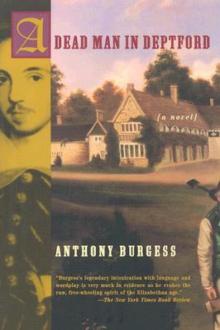 A Dead Man in Deptford
A Dead Man in Deptford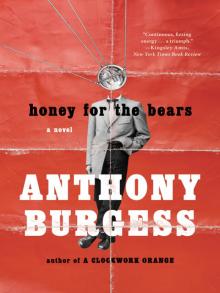 Honey for the Bears
Honey for the Bears 1985
1985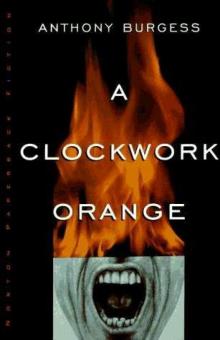 A Clockwork Orange
A Clockwork Orange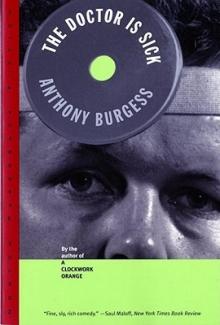 The Doctor Is Sick
The Doctor Is Sick Earthly Powers
Earthly Powers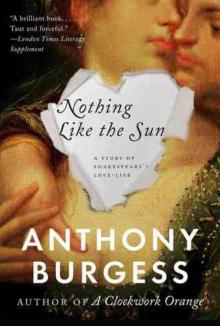 Nothing Like the Sun
Nothing Like the Sun Collected Poems
Collected Poems The Kingdom of the Wicked
The Kingdom of the Wicked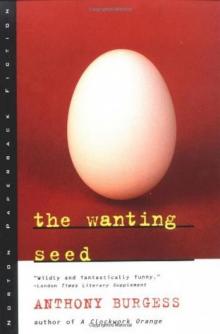 The Wanting Seed
The Wanting Seed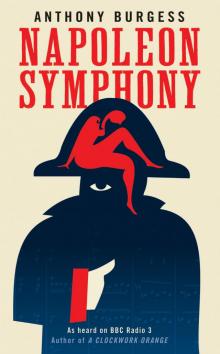 Napoleon Symphony
Napoleon Symphony The Malayan Trilogy
The Malayan Trilogy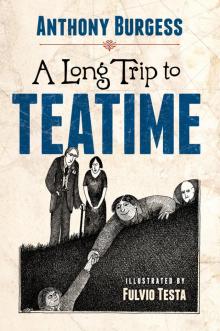 A Long Trip to Teatime
A Long Trip to Teatime Enderby Outside
Enderby Outside M/F
M/F The Complete Enderby
The Complete Enderby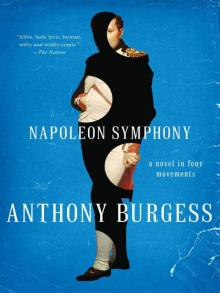 Napoleon Symphony: A Novel in Four Movements
Napoleon Symphony: A Novel in Four Movements Enderby's Dark Lady
Enderby's Dark Lady The Clockwork Testament (Or: Enderby 's End)
The Clockwork Testament (Or: Enderby 's End) ABBA ABBA
ABBA ABBA A Clockwork Orange (UK Version)
A Clockwork Orange (UK Version)